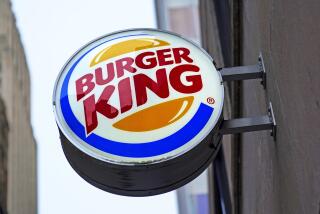Poll Finds Americans Question Manufacturers’ Health Claims
- Share via
Only 3% of Americans believe that food manufacturers never make misleading claims about the health benefits of their products, while a third believe they make them “a lot,” according to a Washington Post poll.
Another third found such statements misleading a “fair amount” of the time and slightly fewer said they were misleading “only sometimes.” The remainder had no opinion or didn’t know.
Figures are based on a Post telephone survey, conducted between Nov. 24 and Dec. 4, of 1,008 randomly selected adults nationwide. Three-quarters of respondents were responsible or partially responsible for deciding which foods their families eat.
Diet and disease have become major concerns of the ‘80s, and food companies have responded with a plethora of nutrition-related messages on their products, ranging from “cholesterol-free” and “high in fiber” to “low in saturated fat,” “lite” and “natural.”
Some have taken it a step further by stating their products will reduce the risk of various illnesses such as cancer or heart disease. And oat bran is being sprinkled into every food short of wine. (Oat bran beer was recently rolled out by Braumeister Ltd., a brewery in Drexel Hill, Pa.)
Almost a third of the $3.6 billion spent annually on food advertising now includes some type of health message, according to Business Week magazine.
But while the Post’s poll indicates that people believe they’re watching marketing magicians, it also suggests they haven’t been able to figure out the tricks. In other words, the public believes it’s being misled by some of these messages, yet doesn’t know how.
Answers suggest that manufacturers either are able to play on the public’s lack of knowledge about certain nutrition facts or may be spreading the confusion themselves.
For example, almost half of respondents believe that when a label claims the product has “no cholesterol,” that it means the cholesterol in the product has been removed.
Supermarket aisles are jammed with foods such as peanut butter, vegetable oils, potato chips and bananas, all claiming to have “no cholesterol” or to be “cholesterol-free.” While these are truthful statements, none of these products had cholesterol to begin with; only animal products contain cholesterol. And with the exception of bananas, many of the products for which this claim is made are also high in fat.
When asked if they would find misleading a label that says a food “contains no cholesterol,” even though the product never contained any in the first place, more than half (52%) said they would find it misleading. And more than a third who found it misleading said it would bother them “a lot.” Only 22% said it wouldn’t bother them at all.
One of the few products making a cholesterol claim from which cholesterol has actually been removed is mayonnaise. Manufacturers are promoting “cholesterol-free” mayonnaises, even though their regular versions contain very little cholesterol.
For example, a tablespoon of regular Kraft or Hellmann’s mayonnaises contains only 5 milligrams of cholesterol. (The American Heart Assn. and other health organizations recommend no more than 300 milligrams per day.)
Nevertheless, the Post’s questionnaire indicates that the public may see a significant benefit to the “no-cholesterol” versions of these products. Sixty-six percent of respondents said that store-bought mayonnaise contains “a lot” of cholesterol.
When it comes to oat bran, two-thirds of respondents didn’t know how much they would need to eat every day to reduce their cholesterol. While everybody reacts differently, clinical studies since 1986 indicate cholesterol reductions from consuming one to five ounces of oat bran daily. (One ounce of pure oat bran equals 1/3 cup.)
At the same time, marketers are sprinkling insignificant amounts of oat bran into high-fat products ranging from doughnuts to potato chips, and Cheerios, which claims to be an “excellent source” of oat bran, contains 8 grams per serving of it (3 1/2 servings of Cheerios contains an ounce of oat bran).
The Post poll also suggests considerable confusion over saturated fat. Almost half of respondents believe that saturated fats are higher in calories than polyunsaturated fats, even though all fats have nine calories per gram. And a third believe that foods labeled “cholesterol-free” are lower in saturated fat. On the other hand, slightly more than half correctly responded that these products could be either higher or lower in saturated fat.
Despite the label claims being made, the poll indicates that shoppers may be scrutinizing products before they buy them. Or if they buy the product, it’s being purchased for reasons other than the proclaimed health benefits.
For example, three-quarters of respondents said that when manufacturers make label claims regarding the health benefits of a product, it would “depend on the product” whether they would buy it.
Labels on products such as Quaker and Nabisco Oat Bran and Continental Baking Co.’s Oatmeal Goodness bread claim that oat bran will help reduce cholesterol. Other items sport flashy labels that draw attention to the inclusion of the grain but skip the cholesterol claim.
Despite the hype, the survey suggests that most people haven’t made oat bran their major weapon in the battle against cholesterol. While almost three-quarters of those polled said they had purchased products containing oat bran in the past year, only 24% said they bought it to reduce cholesterol for themselves or a member of their families.
Of the quarter of respondents who purchased oat bran for cholesterol reduction, nearly half said they didn’t know if it worked. Seventy percent said they were doing other things to reduce their cholesterol levels besides purchasing products containing oat bran.
More to Read
Inside the business of entertainment
The Wide Shot brings you news, analysis and insights on everything from streaming wars to production — and what it all means for the future.
You may occasionally receive promotional content from the Los Angeles Times.








